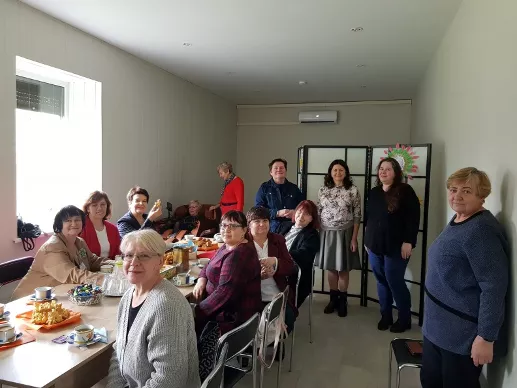Lessons learnt from the Erasmus+ GGA project and new related concepts

There are projects in which partners learn by doing, and there are projects with cognitive learning in focus, and there are (rare) projects where new concepts are introduced together with their conceptual dimensions.
The GGA project »Keep going, reach goals, get an award« is meant to support volunteering of older people. »What can be learned«? is a question that we keep asking ourselves at Slovenian Third Age University each time an EU project proposal reaches us. Will it be worth to spend years of continuous efforts that distance us from our basic educational work and obligations? Volunteering is far from being new for us, so do we really need a new project on older people's volunteering? Initially, in relation to the GGA project, we had these and many other questions and some hesitations.
Questions were old, but answers were new
While writing the Conceptual Background of the GGA Project we used our old knowledge and supplemented it with new perspectives. Old questions were asked, to which we and partners gave new answers! New concepts were born: peer volunteering for instance that I have never come across in literature. It has been found that a more detailed approach to both the specific nature of volunteering supporting status quo and social activism meant to induce social transformation are needed. Moreover, we started being interested again into the role of rituals in older adult education.
What's professionalised volunteering
The project made us understand that volunteering needs everything that professionalises it; research, counselling, guidance, education, reliable statistics. Moreover, a national association of volunteers, a journal would be needed. For the time being in Slovenia, there are several journals pertaining to voluntarism, namely Social Pedagogy, Quality Aging, etc. We already have Slovenian Philanthropy, an influential and well-functioning volunteering organisation that promotes volunteering. Its achievements were presented in the Resource Library of the project. But is this enough ?
Organized volunteering in focus
While writing Help them become volunteers, a manual for educators we focused primarily on older people's organized volunteering. In Lithuania and Latvia there is less of such volunteering than in the Netherlands. in Bulgaria the volunteering of older people is traditionally based on the transmission of culture (the heritage of the Reading Circles and Znanje, the Knowledge Network, that could be found everywhere in the Eastern Bloc countries). Culture has been a prevailiing way for older people to integrate into society in these countries.
We got aware that intergenerational volunteering, was omitted from the GGA project. Moreover, It has been found in a survey conducted by Anton Trstenjak Institute in Ljubljana that 80% of the respondents were willing to socialize primarily with people of their own generation and would prefer the volunteering of people of their generation? What about intergenerational volunteering that supposedly unites generations in fragmented society?
Partners were drawing knowledge from their partnership and from each other
»As individual man has his own unique abilities enabling him to grow to the extent he receives knowledge and other goods from the community cultural treasure; from family and other groups, from his personal learning, experiences and work achievements Man can use his abilities to the extent he is able to share them with others. The same holds good for community: the more of its cultural treasure a community passes onto individuals and other communities, etc. the more the treasure grows. The more innovative solutions to new tasks from the contemporary generations man has, the faster and the healthier he is «argue Jose Ramovš et all« [1] In the GGA partnerhip we were all well aware of this.

Conclusion
The GGA has brought answers, but in the eyes of the partnership it also has limitations - new open questions that are worth to be given in-depth answers leading to new social practices.
Partnerji
Kaunas Region University of the Third Age, Kaunas, Litva
University of Ruse “Angel Kanchev”, Ruse, Bolgarija
NGO “Vecmāmiņas.lv”(Grannies.lv), Riga, Latvija
S.A.F.E. (Sustainable Attitude For Environment), Amsterdam, Nizozemska
Slovenska univerza za tretje življenjsko obdobje, Ljubljana, Slovenija
URL. https://gogetaward.eu/sl/home-slovenscina/
Co -founder of Slovenian Third Age University Dušana Findeisen is currently Head of the Institute for Research and Development of Education, at Slovenian U3A
[1] Jože Ramovš,Maja Rant, Tina Lipar: Pripravljenost za medgeneracijsko prostovoljstvo. Kakovostna starost, Let 19, št 4 (2016) str. 3-24.
Dušana Findeisen is Head of the Institute for Research and Development within Slovenian U3A, She is a researcher and (older) adult educator.


